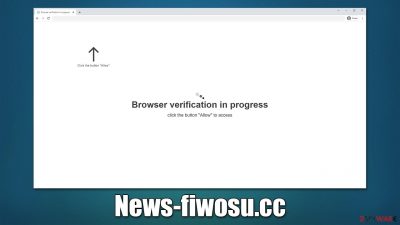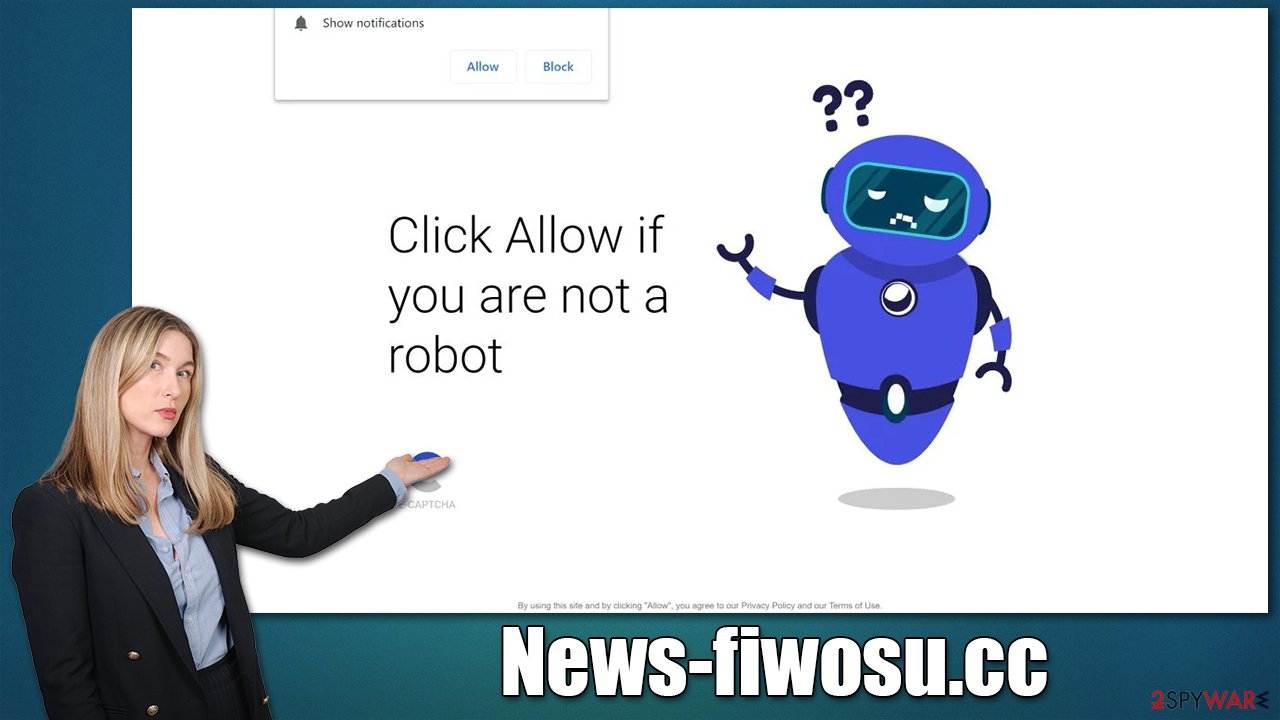News-fiwosu.cc ads (scam) - Free Instructions
News-fiwosu.cc ads Removal Guide
What is News-fiwosu.cc ads?
News-fiwosu.cc misleads users into allowing push notifications to show ads later

News-fiwosu.cc is one example of the thousands of push notification scam sites on the internet. These are websites created by scammers with the intention to misguide users into clicking the “Allow” button within the prompt, which then allows for push notifications to be shown directly on their screen. Because of the fake messages and the misrepresentation of the feature, some users might not think it through and do as they are told.
Unfortunately, this would mean that News-fiwosu.cc is free to deliver notifications at any time, as long as Google Chrome or another used browser is operational. The pop-ups would be shown on top of everything else currently running in the background, even sometimes taking users out of the full-screen mode when watching videos, which can be particularly annoying.
The biggest issue with News-fiwosu.cc ads is that they would not be secure at all and would constantly barrage users with phishing[1] messages that include fake virus infection alerts, get-rich-quick[2] schemes, survey scams, and much more. Clicking these messages could redirect people to malicious websites where they could be tricked into doing various activities that could harm their privacy or security, and malware infections may be possible.
| Name | News-fiwosu.cc |
| Type | Push notifications, pop-ups, ads, scam |
| Distribution | Intrusive pop-ups can start showing up at some point after the “Allow” button is pressed within the notification prompt |
| Symptoms | Pop-ups show up on a regular basis on the screen – these ads often include inappropriate, scam, phishing, or other similar content |
| Risks | Links from the site might cause you to go to harmful websites, which may result in malware infections, financial losses, or personal data exposure. |
| Removal | Access browser settings to stop intrusive push notifications. After that, make sure that your system is not infected with adware or malware – scan it with SpyHunter 5Combo Cleaner |
| Other tips | Delete web caches and other data from your browsers to protect your privacy and prevent information leaks – FortectIntego can quicken this process |
In the online scam scheme, users are deliberately presented with information that can be misinterpreted in a way that would help scammers to achieve their goals. By using unexpected redirect routes, crooks can use the element of surprise to their favor. As soon as people land on News-fiwosu.cc, they are presented with one of the following fake messages:
- Click Allow to confirm that you are not a robot
- Click “Allow” to win the prize and get it in our shop!
- If you are 18+, click Allow
- Click Allow to start downloading
- Press “Allow” to watch the video
- Just one more step! “Allow” to continue
These requests can seem completely normal, considering that many users have already encountered captchas, age-restricted sites, and similar. This familiarity is one of the main perks of social engineering techniques used here, as people can simply think it's just another check they have to bypass.

In reality, as soon as the “Allow” button is pressed, they automatically allow the site to deliver push notifications, which could bring more suspicious material directly to users' screens. It is worth noting that there are thousands of push notification scam websites that use exactly the same messages and images when accessed, including News-page.net, W3needman3w.com, Pushyoumail.com, and many others.
Why you should check your system for adware
Before you get rid of the annoying News-fiwosu.cc pop-up notifications, be sure to double-check your operating system. While most people end up on phishing sites after being redirected from other high-risk places such as torrents, and peer-to-peer[3] networks, which are well recognized for hosting boobytrapped links, this is not always the case, and adware may be at play. This potentially unwanted software is often installed unintentionally, so people may not even suspect it is secretly running in the background, exposing them to malicious ads.
For this reason, we recommend scanning your system with SpyHunter 5Combo Cleaner or Malwarebytes security software to guarantee that any harmful software on it is immediately quarantined and deleted. Anti-virus applications are also your most effective tool for defending against incoming virus attacks, as long as their definitions are updated to the current version. If necessary, use FortectIntego to automatically clean browser cache files and repair virus damage – it can benefit privacy and make sure that your system is not struggling from crashes, errors, and other stability issues.
Get rid of the annoying ads
Users are often baffled about where the push notifications come from and what is causing them – that's because they are introduced to them via a scam scheme. It is not difficult to see how suspicious pop-up messages could make people believe that their systems are infected, although it's not the case here, and scanning the system with security software would not bring any positive results in removing these pop-ups.
Although it may seem difficult, getting rid of push notifications is quite simple – you just have to know where to look. In order to make sure that a particular website – in this case, News-fiwosu.cc – can no longer deliver notifications to your screen, you have to access browser settings and deny access to it via the site settings:
Google Chrome
- Open the Google Chrome browser and go to Menu > Settings.
- Scroll down and click on Advanced.
- Locate the Privacy and security section and pick Site Settings > Notifications.
- Look at the Allow section and look for a suspicious URL.
- Click the three vertical dots next to it and pick Block. This should remove unwanted notifications from Google Chrome.
![Stop notifications on Chrome PC 2 Stop notifications on Chrome PC 2]()
Google Chrome (Android)
- Open Google Chrome and tap on Settings (three vertical dots).
- Select Notifications.
- Scroll down to the Sites section.
- Locate the unwanted URL and toggle the button to the left (Off position).
![Stop notifications on Chrome Android Stop notifications on Chrome Android]()
Mozilla Firefox
- Open Mozilla Firefox and go to Menu > Options.
- Click on Privacy & Security section.
- Under Permissions, you should be able to see Notifications. Click the Settings button next to it.
- In the Settings – Notification Permissions window, click on the drop-down menu by the URL in question.
- Select Block and then click on Save Changes. This should remove unwanted notifications from Mozilla Firefox.
![Stop notifications on Mozilla Firefox 2 Stop notifications on Mozilla Firefox 2]()
Safari
- Click on Safari > Preferences…
- Go to the Websites tab and, under General, select Notifications.
- Select the web address in question, click the drop-down menu and select Deny.
![Stop notifications on Safari Stop notifications on Safari]()
MS Edge (Chromium)
- Open Microsoft Edge, and go to Settings.
- Select Site permissions.
- Go to Notifications on the right.
- Under Allow, you will find the unwanted entry.
- Click on More actions and select Block.
![Stop notifications on Edge Chromium Stop notifications on Edge Chromium]()
Internet Explorer
- Open Internet Explorer, and click on the Gear icon at the top-right of the window.
- Select Internet options and go to the Privacy tab.
- In the Pop-up Blocker section, click on Settings.
![Stop notifications on Internet Explorer Stop notifications on Internet Explorer]()
- Locate the web address in question under Allowed sites and pick Remove.
How to prevent from getting adware
Access your website securely from any location
When you work on the domain, site, blog, or different project that requires constant management, content creation, or coding, you may need to connect to the server and content management service more often. The best solution for creating a tighter network could be a dedicated/fixed IP address.
If you make your IP address static and set to your device, you can connect to the CMS from any location and do not create any additional issues for the server or network manager that needs to monitor connections and activities. VPN software providers like Private Internet Access can help you with such settings and offer the option to control the online reputation and manage projects easily from any part of the world.
Recover files after data-affecting malware attacks
While much of the data can be accidentally deleted due to various reasons, malware is one of the main culprits that can cause loss of pictures, documents, videos, and other important files. More serious malware infections lead to significant data loss when your documents, system files, and images get encrypted. In particular, ransomware is is a type of malware that focuses on such functions, so your files become useless without an ability to access them.
Even though there is little to no possibility to recover after file-locking threats, some applications have features for data recovery in the system. In some cases, Data Recovery Pro can also help to recover at least some portion of your data after data-locking virus infection or general cyber infection.
- ^ Phishing attacks. Imperva. Application and data security.
- ^ Get rich quick scams. SRA. Solicitors Regulation Authority.
- ^ James Cope. What's a Peer-to-Peer (P2P) Network?. Computerworld. IT news, careers, business technology, reviews.






